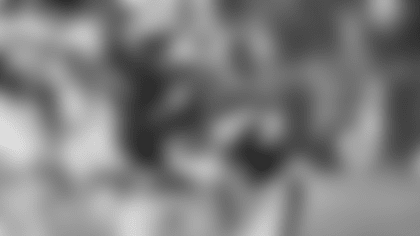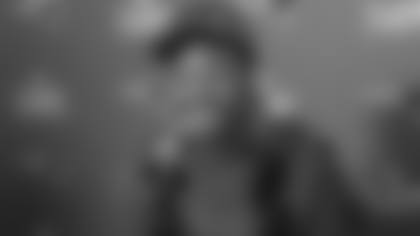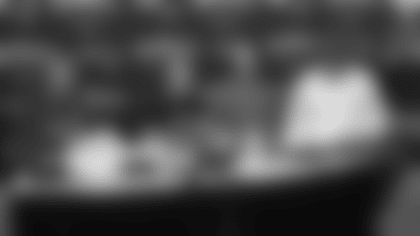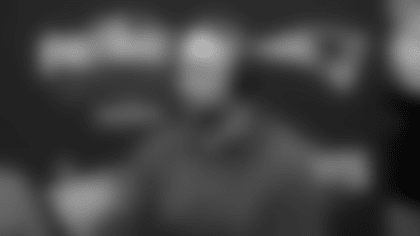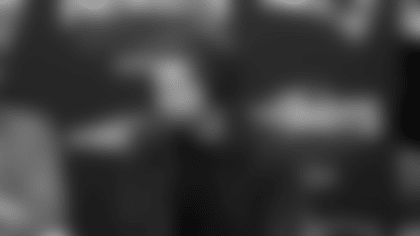Patriots defensive coordinator Dean Pees addresses the media during his conference call on Tuesday, September 22, 2009.
Q: When you go back and look at the Jets game, was the game plan to drop back into coverage or did you not get the type of rush you were anticipating?
DP: We can always improve in the rush, but some of it was designed by game plan to play some coverage and some of it was designed to put some pressure on [Mark Sanchez]. We didn't always get there like we wanted to, but we need to improve in the rush part of it and the coverage part of it.
Q: What were the things that you tried to take away from the Jets, offensively?
DP: No matter who the opponent is, you can't let somebody run the ball and it started out pretty well there. Then, we got into a couple of different things where they hurt us in the run. Then, we kind of got settled down a little bit. The other thing is you have to take away big plays. There are two things that every week, always hurt you — penalties and big plays. Usually, if you can avoid those two things … We didn't get penalized any on defense on Sunday. But we gave up a big play — that was a direct correlation to leading to the one touchdown. When we look back at the season thus far and we've given up three touchdowns, basically in all three of them there is either a big penalty or big play. Going into the game, you never want to let a team run the ball — whether it's the Jets or anybody — and then you just can't give up big plays.
Q: Are you happy overall with the run defense? It seems like you guys did particularly well, especially when you went to the four-man line.
DP: There are certainly some things we can improve on. They got into a series where they ran the ball about three or four straight plays on us and had some success. We're never pleased when we give up more than 100 yards in a game, but some of it is a scheme thing. Sometimes we have to play better and coach it better. When you come out of a loss like that, you're really not happy with anything.
Q: Looking at Atlanta and the threat Matt Ryan poses, do you still take the approach of stopping the run first?
DP: Yeah, I think you do that almost every week, no matter who you are playing — even if it's a team that throws 50-plus times a game. If it becomes a two-dimensional game, that's always a tough one. But, yeah, they are a really good offensive football team. We have always had a ton of respect for [Michael] Turner. [Jerious] Norwood, there's another guy that can run the ball. Before, they always had a good running attack, a good offensive line. They had two good receivers in [Michael] Jenkins and [Roddy] White. But the things they've added now, [with] Tony Gonzalez — probably one of the best tight ends to ever play — if you add him to that offense, along with the year that [Matt] Ryan had last year … It looks like [Ryan]'s picking up right where he left off. This is a very, very potent offense. We've got our hands full.
Q: Are you happy overall with the play of Adalius Thomas so far this season? With Jerod Mayo out, are you looking for him to take a bigger role in the pass rush or inside stopping the run?
DP: I think we're looking for everybody to step up, and everybody to be accountable, and everybody to play hard. It's never one guy. We all have to do better, whether it's the coaches, or whether it's the players. It's not just Adalius, not just Mayo, not just anybody, not [Brandon] Meriweather, not any one guy. We all have to do a better job; that includes Adalius, that includes everybody. Sometimes we're going to be putting him in positions where he needs to make the play and other times it may be the type of defense where he's not going to have as many opportunities as maybe somebody else has. I can't always tell you what that's going to be. We just need everybody to step up and everybody to do their job and play better. And I have to do a better job of coaching better.
Q: How did Gary Guyton grade out replacing Jerod Mayo?
DP: I thought Gary did a good job being in there for the first time playing inside. He's a little bit new, but at the same time he's practiced there and played there some in the preseason. Overall, I thought he did OK. There are certainly some things that he can improve on to get better. Overall, he got the calls in and kind of ran the defense. I thought he did OK.
Q: How about Brandon McGowan in that hybrid role?
DP: Same thing. I mean, we asked him, James Sanders, Shawn Springs, and all those guys back there — just like we ask all the guys — to learn multiple positions and to jump in where needed. So based on what the game plan is calling for and how we think we need to stop the team, we're going to ask certain guys to do certain things. Sometimes it's a bit new for them. But overall I thought Brandon [McGowan] — kind of like Guyton — there are good things the guys did and there were some not so good things guys did. Obviously, anytime you lose a ball game, there are things you can do better. At the same time, it wasn't a day where you look back and say everybody was terrible. We did some good things and there's a bunch of things we need to improve on. McGowan would be one of those guys just like that.
Q: With these different alignments, do you use them because you think — for instance in this game — that Shawn Springs is a better fit at safety versus the Jets offense? Or is part of it throwing in different wrinkles to confuse the quarterback? Especially a young quarterback like Mark Sanchez who might say "I'm not used to seeing a guy like Shawn at safety." And that might change his progressions?
DP: It could be both of those or all of those. We sit down as a staff and think, "OK, what's the best way to attack these guys on defense?" And, "Who are the guys that can do that best?" You can go all the way back to 2004 when we played the Steelers in the AFC Championship Game and we played one defense and then two weeks later in the Super Bowl we played an entirely different defense with entirely different personnel against the Philadelphia Eagles. It was "What's the best way we can attack these guys and who are the best players we can put in the best positions to get that done?" A lot of it's based on their offensive personnel and a lot of it's based on what our personnel is too.
Q: Over the years, Rodney Harrison would match up against an elite tight end. Who's that guy now or is there a guy now you feel you can put on an elite tight end like Tony Gonzalez?
DP: I think there are several guys who we need to figure out which one is the best matchup physically and the best matchup for the kinds of routes and the kinds of things this guy does; whether he's a physical tight end in his route running or if he's more of a finesse tight end. It's probably going to vary from week to week. We're going to try to use different personnel and that may not ever be the same guy twice. Sometimes it might me more than one guy. Again, it's kind of whatever personnel we have available, and based on the kind of tight end and personnel we're playing.
Q: How do you feel you've defended tight ends through the first few games?
DP: Probably average. The last game, [Dustin] Keller scored on us, so we didn't do a good enough job on him. That's for certain. We need to do a better job in the red area down there. We didn't get that one done. So overall I don't know if I can assess what we've done on the tight ends. That's a little bit unfair to some people because it may be a situation where we may have put a lot of emphasis on covering outside guys, so we might be a little light on the tight end. Or — if it's a game where we put a lot of emphasis on the tight end and we didn't cover him — then that would be very bad. So it's really hard to assess that and really say, "You know, we've really got to do a better job on all of them."
Q: Sometimes it seems to help stop the run when you have a four-man line. Other times a three-man line with the linebackers coming in also works. Do different types of alignments for different types of backs work?
DP: I think that's a little bit of it. But I think more than anything else it's whatever your defensive personnel dictates what you can do best. If every front was a great front against a run, everybody would play that front. There are certainly really good defensive football teams that play a four-man front and there are really good defensive football teams that play against the run that play a 3-4 front. So I think it's based on the defensive personnel as much as anything else. What's your best personnel that you can put on the field, based on what they do in the running game to stop it? Like I said, there are good 3-4 teams against the run. There are good 4-3 teams against the run. So it's not any one scheme. It's what your personnel dictates you can do.
Q: One play from the Jets game that stood out to me as a dagger was the third and 13, late in the third quarter. The Jets had the ball at their own 12. That was a big field position shift if you could've stopped them. What happened on that play where the Jets were able to convert that?
DP: We just got out of our zones a little bit. We had what we thought would be a good call against it, but it turned out not to be. We got out of our zones a little bit and got a little antsy. [Mark Sanchez], give him credit, stuck one in there on us. Yeah, that was certainly a third down that we should have gotten off the field and we didn't. We just have to do a better job of coaching that and a better job of playing that particular defense.





















